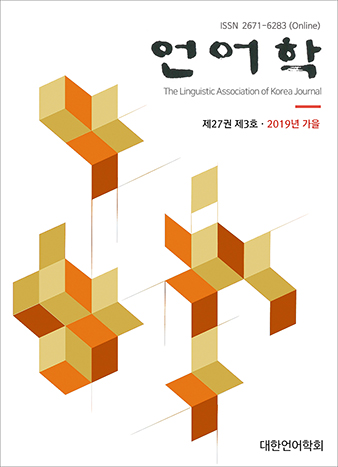대한언어학회 전자저널

27권 3호 (2019년 9월)
- 한국인의 불평 화행 연구
-
안정근
Pages : 1-22
Abstract
Ahn, Jeong Khn. (2019). A study of the complaint speech act for Koreans. The Linguistic Association of Korea Journal, 27(3), 1-22. This study examines Koreans complaint speech act in which 204 subjects participated in survey that elicited their responses from ten complaint situations. As somewhat anticipated, they opted out 31.3% of the total responses in survey questionnaire and used only 4.74 words on average on a complaint situation, which means that they complained very shortly. Gender difference is found in which men used more words than women. Age group difference is also found in which the lower age group used more words than the older age group. Considering social factors, the study finds that relatives used less words than other social groups including strangers, acquaintances, and friends, and the respondents used more words when social obligation was more explicit than implicit. For severity level on a 1 - 5 scale, their severity level in the study is 2.54 on average which indicates that they complained in the middle of indirect and mitigated on the severity scale. Gender difference is not found but age group difference is found for severity level in which the 21-29 age groups severity level is higher than age group over 30 at p < .05 level. Considering social factors for severity level, the study also finds that severity level is the greatest for friends and the weakest for relatives. For social status, severity level is the greatest for equals and the weakest for younger speakers. And for social obligation, severity level is found greater when social obligation was more explicit than implicit. They scarcely used softeners and intensifiers in the study.
Keywords
# 국인의 불평 화행((Korean’s complaint speech act) # 불평 화행의 성별 차이(gender difference in complaint) # 불평 화행의 연령대별 차이(age group difference in complaint) # 불평 화행의 사회 변인들(social factors in complaint)
References
- 강현화, 황미연. (2009). 한국어 교육을 위한 불평표현 문형 연구 - 불평화행과 인용표현의 관계를 중심으로, 한말연구, 24, 5-31.
- 곽소로. (2017). 한국인의 불평 화행 연구: TV 토크쇼 및 예능 프로그램을 중심으로. 석사학위논문. 전남대학교.
- 김동희. (2015). 여성결혼이민자의 공손표현 사용양상: 고부간 불평상황을 중심으로. 석사학위논문. 세종대학교.
- 김혜정. (2008). 가족 간 갈등대화의 구조와 책략 연구-고부 부부 간 갈등 대화를 중심으로. 박사학위논문. 인제대학교.
- 미즈시마 히로코. (2003). 한국어 불평 화행의 중간 언어적 연구. 석사학위논문. 이화여자대학교.
- 박재현. (2012). 서비스 상황에서의 불평 화행 교육 방안 연구: 한국어모어 화자와 중국인 학습자의 발화 양상 비교를 중심으로. 석사학위논문. 고려대학교.
- 상일화. (2014). 드라마를 활용한 한국어 불평 화행 교육 방안. 석사학위논문. 경희대학교.
- 안정근. (2015). 한국인의 거절화행 전략: 나이와 남녀 차이. 언어학, 23(1), 139-160.
- 오상이. (2005). 불만표시 발화행위: 독일인과 한국인의 상호문화 비교. 중등교육연구, 53(2), 199-220.
- 유양, 양명희. (2014). 한국 내 중국인 직장인의 불평 화행에 대한 연구: 하위 전략을 중심으로. 한국어 의미학, 46, 279-302.
- 유양, 양명희, 문지순. (2014). 한국 내 중국인 직장인의 불평 화행에 대한 연구: 상위 전략을 중심으로. 사회언어학, 22(3), 135-154.
- 유연. (2008). 대화에 나타난 불평화행의 형식적 기제 연구-드라마 대화를 중심으로. 텍스트언어학, 39, 157-181.
- 이금양. (2017). 중국인 한국어 학습자의 불평 화행 실현 양상에 대한 연구: 중국 내 20대 중급 학습자를 중심으로. 석사학위논문. 연세대학교.
- 이민정. (2010). 한국어 불평 화행 교육 방안 연구: 한국어 모어 화자의 담화와 교재 분석을 중심으로. 석사학위논문. 한양대학교.
- 이선희. (2010). 한국어 화자와 일본어 화자의 서비스 장면에서의 불평 화행. 일본어교육, 51, 15-26.
- 이선희. (2012). 한국어 화자와 일본어 화자의 불평 응답 화행. 일본어교육, 62, 129-141.
- 정민주. (2017). 다문화 고부 갈등 대화에 나타난 불평 화행의 실현 양상과 교육적 시사점. 국어교육연구, 64, 21-48.
- 조정민. (2004). 한국어 불평에 대한 응답 화행 실현 양상 연구: 일본어권 한국어 고급 학습자를 대상으로. 석사학위논문. 이화여자대학교.
- 증일첩. (2016). 한국어 불평에 대한 응답 화행 실현 양상과 교육 방안 연구. 석사학위논문. 중앙대학교.
- 진양. (2010). 한국어와 중국어의 불평 화행에 관한 대조 연구. 석사학위논문. 중앙대학교.
- 최명선. (2007). 한국어 불평 응답 화행의 양상과 교육 방안 연구: 한국인 모어 화자와 일본인, 중국인 학습자의 담화 분석을 중심으로. 석사학위논문. 고려대학교.
- 최연숙. (2013). 구두 DTC와 회고적 보고 방법을 활용한 불평 화행의 전략 사용 연구: 베트남 결혼이민자 한국어 학습자를 중심으로. 석사학위논문. 이화여자대학교.
- 카나모리 사야카. (2016). 영화를 활용한 한국어 불평화행 교육 방안 연구. 석사학위논문. 세종대학교.
- 혼다 토모쿠니, 김인규. (2009). 한국어·일본어 불평 화행의 비교 문화 화용론적 연구. 국제어문, 45, 5 –44.
- 홍승아. (2010). 한국어 학습자의 한국 거주기간에 따른 불평 화행의 인지 연구. 석사학위논문. 이화여자대학교.
- Ahn, J. (2011). Cross-cultural variations of apology realization in Korean. The Sociolinguistic Journal of Korea, 19(2), 261-285.
- Ahn, J. (2012). Why do Koreans explain a lot when making an apology? The Linguistic Association of Korea Journal, 20(3), 1-15.
- Blum-Kulka, S., & Olshtain, E. (1986). Too many words: Length of utterance and pragmatic failure. Studies in second language acquisition, 8, 47-61.
- Blum-Kulka, S. (1989). Playing it safe: The role of conventionality in indirectness. In S. Blum-Kulka, J. House, & G. Kasper (Eds.), Cross-cultural pragmatics: Request and apologies (pp. 37-70). Norwood: Ablex.
- Katz, L. (1987). Face risk in the expression of censure: A cross-cultural study. Unpublished master’s thesis, School of Education, Tel Aviv University.
- Li Mingji. (2010). 중국어권 학습자를 위한 한국어 화행 교육 연구. 석사학위논문. 서울대학교.
- Olshtain, E. & Weinbach, L. (1993). Interlanguage features of the speech act of complaining. In G. Kasper & S. Blum-Kulka (Eds.), Interlanguage pragmatics (pp. 108-122). Oxford: Oxford University Press.
- Weizman, E. (1989). Requestive hints. In S. Blum-Kulka, J. House, & G. Kasper (Eds.), Cross-cultural pragmatics: Request and apologies (pp. 71-92). Norwood: Ablex.